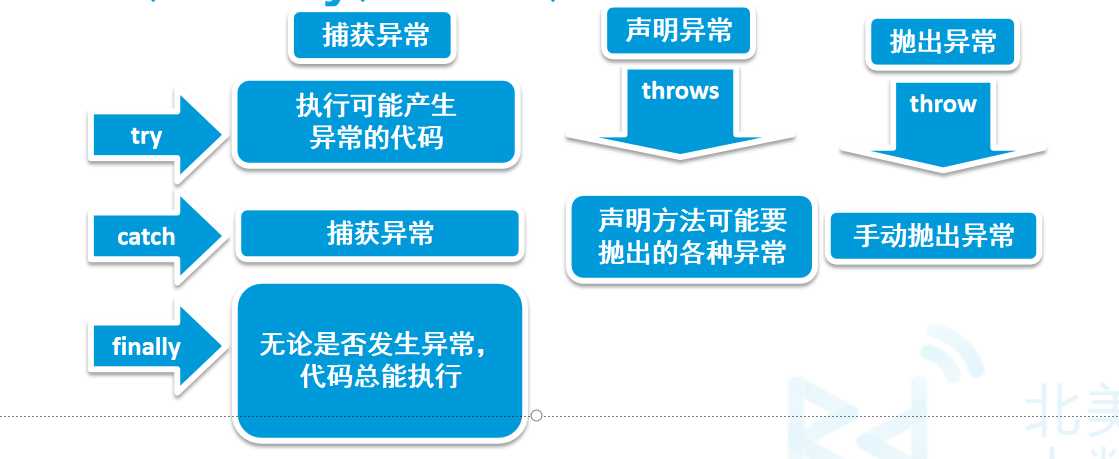标签:父类 出现 catch 虚拟 sed void 设置 错误处理 mamicode
一、异常
1.什么是异常
异常是指程序在运行是发生的不正常事件,会中断运行的程序称之为异常
2.什么是异常处理
Java编程语言使用异常处理机制为程序提供了错误处理的能力。一般处理顺序为:程序中预先设置好 对付异常的处理办法→程序运行→异常→对异常进行处理→处理完毕,程序继续运行
3.Java中如何进行异常处理
Java的异常处理是通过5个关键字来实现的:try、catch、 finally、throw、throws

4.try catch
1 public class text { 2 public static void main(String[] args) { 3 Scanner in = new Scanner(System.in); 4 System.out.print("请输入被除数:"); 5 int num1 = in.nextInt(); 6 System.out.print("请输入除数:"); 7 int num2 = in.nextInt(); 8 try {//try中可能出现异常的代码 9 System.out.println(num1+"/"+ num2 +"="+ num1/ num2); 10 System.out.println("感谢使用本程序!"); 11 } catch (ArithmeticException e) {//在程序发生异常时候执行的代码 括号中变量是可能出现的异常类型 12 System.out.println("除数不能为零"); 13 } 14 15 } 16 }
Java中的异常类是存在继承关系的Exception父类可以代替任何子类,找出所有的异常,但是异常涉及面太广所以在设计代码时要精写,有时异常不仅仅是一个catch块,所以catch块可以多个存在多个。如以下代码
public class text { public static void main(String[] args) { Scanner in = new Scanner(System.in); System.out.print("请输入被除数:"); int num1 = in.nextInt(); System.out.print("请输入除数:"); int num2 = in.nextInt(); try {// try中可能出现异常的代码 System.out.println(num1 + "/" + num2 + "=" + num1 / num2); System.out.println("感谢使用本程序!"); } catch (ArithmeticException e) {// 在程序发生异常时候执行的代码 括号中变量是可能出现的异常类型 System.out.println("除数不能为零"); } catch (NullPointerException e) { System.out.println("空指针异常"); } catch (ClassCastException e) { System.out.println("类型转换异常");//如果没有满足上述异常执行顶级异常(未知异常) }catch (Exception e) { //异常需要从小到大的顺序 将顶级异常放在最后 System.out.println("顶级异常"); } } }
5.try catch finally语句
使用finally语句无论是否出不出现异常都会执行。代码最先执行try语句 出现异常执行catch 在执行finally块,如果在代码中加入了system.exit(1)则直接退出虚拟机不会运行finally语句
try catch 和try finally都能单独使用 但是不能省略try块且不能单独存在
6.throw 和throws
throw:是抛出具体的某个对象,方法内部可能存在异常。请调用方处理 方法名末尾(在该方法中根本没有对该类异常的捕获)
throws声明异常,通知调用方方法内部可能存在异常请调用方处理
public class text { public static void main(String[] args) { try { b(); } catch (FileNotFoundException e) { // TODO Auto-generated catch block e.printStackTrace(); } } public static void a () throws FileNotFoundException {//声明可能异常 FileInputStream aFileInputStream=new FileInputStream("a.txt"); } public static void b() throws FileNotFoundException { a(); } }
7.异常链
使用异常链可以一层一层的去追溯错误的产生和传递,例如:我在mian方法中调用method1方法,在method1方法中调用method2方法,在method2方法中抛出一个空指针异常。
public class Test { public static void main(String[] args) { Test t = new Test(); try { t.method1(); } catch (Exception e) { e.printStackTrace(); } } public void method1() throws Exception { try { method2(); } catch (Exception e) { Exception exception = new Exception("method1 exception"); exception.initCause(e); throw exception; //或者 //throw new Exception("method1 exception", e); } } public void method2() { throw new NullPointerException("method2 exception"); } }
运行结果如下

可以看到 method1 exception,然后Caused by method2 exception。之所以产生异常链,是因为
Exception exception = new Exception("method1 exception"); exception.initCause(e); throw exception; //或者 //throw new Exception("method1 exception", e);
如果不这样处理,打印如下
java.lang.NullPointerException: method2 exception at normal.Test.method2(Test.java:31) at normal.Test.method1(Test.java:19) at normal.Test.main(Test.java:10)
标签:父类 出现 catch 虚拟 sed void 设置 错误处理 mamicode
原文地址:https://www.cnblogs.com/wuxuewei/p/10972100.html